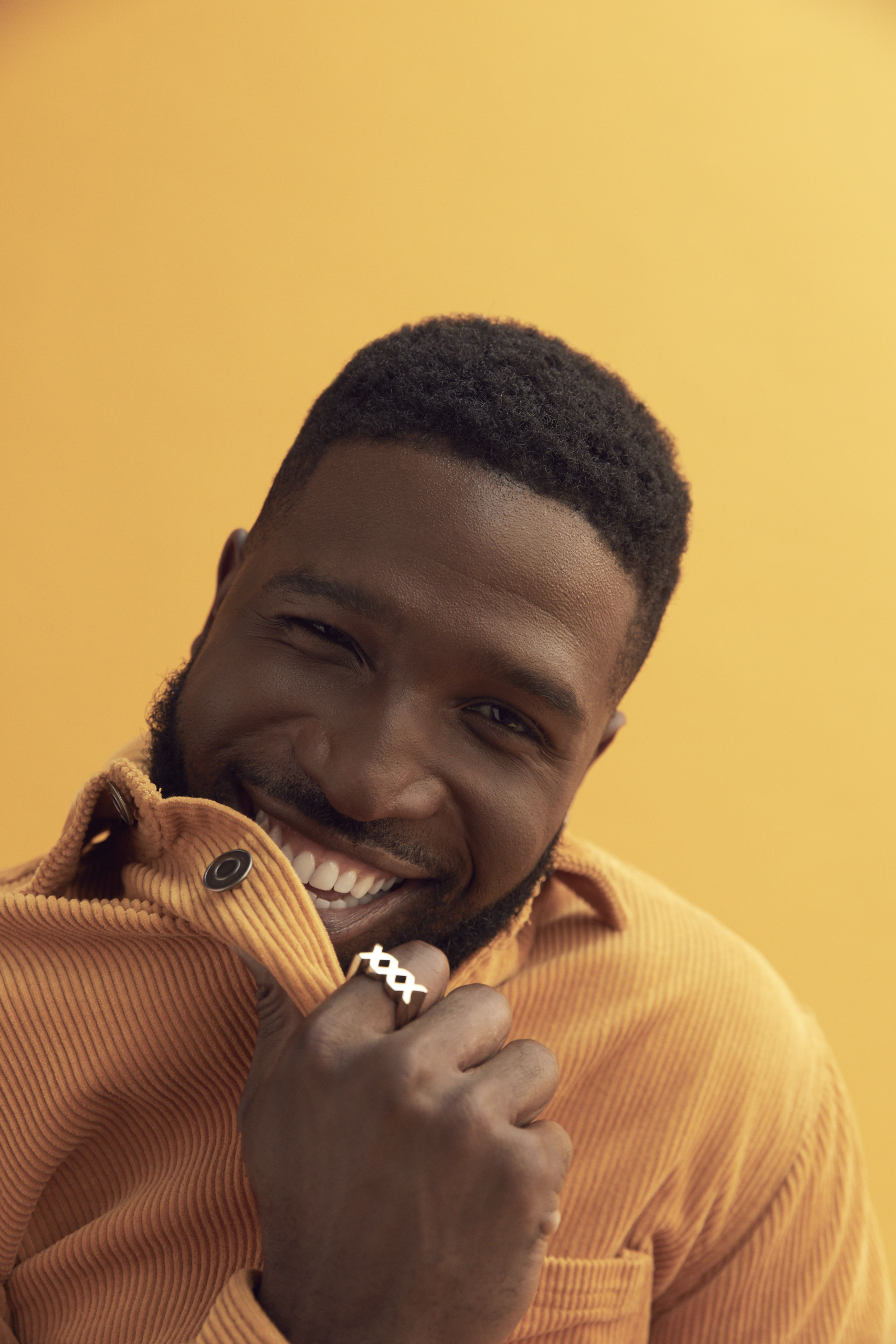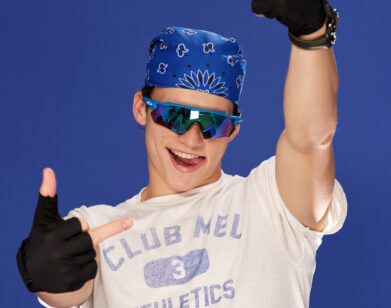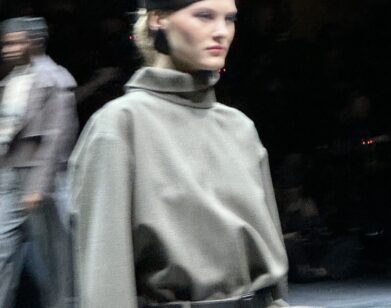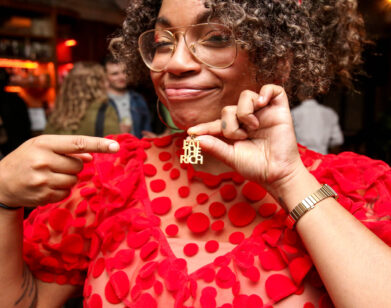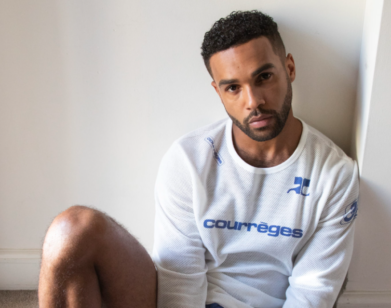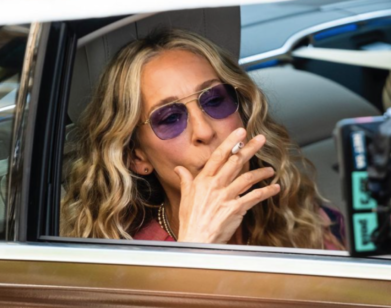in conversation
Brandon Kyle Goodman and Lily Collins Want to Have Those Awkward Conversations
Having difficult conversations in public is not something everyone is cut out for, but for Brandon Kyle Goodman, it’s just another day at the office. Before becoming a beacon of light in the aftermath of George Floyd’s murder, the 33-year-old Queens native was best known for a growing roster of acting credits, like their role as a father-to-be opposite Andrew Scott in Amazon’s anthology series Modern Love, and as Sofia Carson’s best friend in the Netflix dance romp Feel the Beat. But when nationwide protests broke out last summer, Goodman, who also writes and does voicework for the Netflix animated comedy Big Mouth (and its upcoming spinoff Human Resources), Goodman took to their Instagram to post videos where they share their thoughts on systemic racism, advocate for Black lives, and discuss the entertainment industry’s ongoing reckoning with inclusion. This fall, Goodman expanded their empire with two new podcasts, Black Folx and Do the Work, where they aim to drive conversations for Black and non-Black listeners on how to, simply put, become better people. A few weeks ago, Goodman connected with their friend and fan Lily Collins to talk about creating content that heals the soul, the necessary selfishness of self-care, and their love for The Real Housewives. —ERNESTO MACIAS
———
LILY COLLINS: [My fiancé] Charlie [McDowell] sends his love. He’s like, “Okay, I know that we’ve told them 10 times, but please remind Brandon and Matthew [Raymond-Goodman, Brandon’s husband] and Korey [their dog] that they are all welcome to come up for the day.” We also have a guest room. You are so welcome to come stay.
BRANDON KYLE GOODMAN: My husband’s like, “When can we go?”
COLLINS: I mean, it’s the most perfect weather, it’s so calm, and there’s not as many people.
GOODMAN: I’m just waiting for the year to end, and then I’ll have some time, but yes. The answer is yes, we’re coming.
COLLINS: I was introduced to you by Charlie showing me videos that you had done. I remember reading the piece that you wrote the day after George Floyd’s murder. I took your piece, and I put my name in that you space and turned it into an I—and really realized what I hadn’t known, what I hadn’t actively done, and had been unaware of. As myself, a white female, who admits that there was a lot that I didn’t know, I have learned so much from your videos and your writing and your interviews. What is it that you hope people walk away from when they come to your social platform or hear you speak?
GOODMAN: My hope is that humanity keeps coming up, that they see me and the people that I’m talking about as human, and therefore worthy of their attention—their time, their passion and commitment. My page ranges from being funny to serious to educational, and sometimes dumb. All of that in the hopes that I’ll be seen as a full person. The people following me enjoy me, and love me—I hope they will take that same energy and apply it to the people in their lives.
COLLINS: Social media can have so many different effects. I’ve seen it in both ways, where people go on other people’s pages and just troll and speak negatively. It’s been quite amazing to see the community that has built around your platform, and that’s a testament to what you speak about and how you speak about it. Amongst all the chaos of the last eight months, what have you and your family done to stay centered?
GOODMAN: There have been times where I’ve had to go away by myself and let Matthew stay here with Korey. I got a house in Palm Springs for a weekend just to be by myself and center. I’m naturally a workaholic—I feel like you probably relate to this. I go, go, go, go. When I’m in that space, I have no energy to give to anybody, and I have nothing to say about anything, and my thoughts don’t exist anymore because I’m literally on fumes. I’ve had to build that muscle of self-care. As Ashlee Marie Preston said, there’s this whole brand around self-care which is, like, let me go to the spa or whatever, and it’s not quite that. It’s a little more intentional, a little more personal, a little more about what Brandon needs, which is to shut a door and not hear anything. Or to watch Emily in Paris, or Living Single.
COLLINS: Wow.
GOODMAN: Really! It gives me and Matthew and Korey a chance to refuel and remember what we’re fighting for. Because there are so many voices, and I don’t mean just in Black Lives Matter. I think as an actor you have to constantly check in about what the intention is about everything. Part of my business as an actor or as a writer is celebrity or content. Then there’s also this other part, which is activism, which has nothing to do with celebrity, but they cross-pollinate. I’m always trying to find that balance of, “When is it okay for it to be about me, and when is it about everybody else?”
COLLINS: That takes a lot of knowing yourself in order to know when the focus needs to shift. I’ve always said that self-care is self-love, not selfishness. I was told by someone, “Don’t you think that that’s kind of selfish? You ask so many questions and you’re always in your head thinking about things.” I’ve never thought of self-reflection as selfish. In fact, I’m doing it to make myself a more solid human, to be a better partner, to be a better dog mom, to be a better actor, and to be a better human.
GOODMAN: Culturally, I think about women and I think about queer people. We are taught that our value comes from what we can give and that our value comes from expending energy. I think women get this even more. When you take time for yourself, you’re selfish. But we are useless if our oxygen mask isn’t on as well.
COLLINS: Out of this period, you now have two podcasts, Black Folx and Do The Work. When you came up with the ideas for your podcasts, were they based on real experiences that you’d had? Have you had those awkward conversations?
GOODMAN: With Do The Work, we’re on episode three, and I’m almost done recording. What I realized is a lot of people didn’t know how to have those conversations. I would be willing to bet that most of us in the U.S, when we studied Black history, it was February and you probably hit Harriet Tubman, civil rights, and maybe Obama, and that was it. We don’t talk about the screaming that a mother had to do when her child was torn away from her. We don’t talk about the ways in which people were whipped and brutalized and lynched. We don’t talk about Emmett Till. But it’s the reason why we are still bumping up against each other right now. Do The Work is special to me because I really think it gives people the tools. My other podcast, Black Folx, is really important to me, because we talk about the moments we experience as Black people, together. One of my favorite episodes is with Alesha Renee, and she said, “The first time I ever was told I was beautiful, I was beautiful for a Black girl.”
COLLINS: Another thing that you do is Big Mouth, and that deals with sex ed. That’s awkward. It’s all these things that are fucking awkward but universal. At least as a kid, it was always awkward to talk about sex. Why wasn’t there a show like this when I was younger? I went to a Catholic school, and sex ed was something that you giggled about. It wasn’t spoken about in a way that was palpable, understandable, and normalized to the point where you didn’t feel super awkward talking about things.
GOODMAN: You know, there was a show on HBO late at night called Real Sex that I used to watch when everyone was asleep. Then I would also sneak and watch Sex and the City. Those were the closest to sex ed I could get.
COLLINS: That’s amazing.
GOODMAN: Samantha was talking about dicks, and I was like “Yeah, tell me more.”
COLLINS: “Samantha, teach me your ways.”
GOODMAN: It was always taboo. I went to high school in Georgia, so our sex ed class was maybe a day, and it was basically: “Wear condoms. The dick goes in the vagina but put a condom on or wait until you’re married.” That’s why I’m grateful for Big Mouth. I was a fan before I joined as a writer. It has been so cathartic because puberty is so traumatizing, and it defines so much of your adulthood; so much of who we are as adults is shaped, for better or worse, by the trauma of puberty. I hope teenagers who are watching the show, if they’re allowed, now have language for what they’re currently going through. What we end up learning is that we need permission from other people to do something with our bodies. We see it with our government, trying to take away abortion rights.
COLLINS: I remember in my early 20s, I was talking to this lady, and she was like, “You know that you found the right person when you can go to the bathroom with the door open.” I was like, “Oh my god, what are you talking about? No way.” I’m half-British as well, so there’s a very different vibe in England—more proper. I think in quarantine, there have been so many barriers that have gone down, and I feel like we’re on this precipice of more people talking about shit. Admitting things—the good, the bad, the ugly, the hard, the easy. That’s why I love what I get to do, whether it’s with subject matter like mental health, sex ed, or it’s something like Emily in Paris where you get to laugh and smile for a second when the world has been super dark. Has there been something, other than something you’ve worked on, that has been healing for you as a viewer?
GOODMAN: I’m not kidding—Emily in Paris showed up at a beautiful time. I’m truly not trying to gas you. I think I messaged you on Instagram after we watched it. Then there’s Moesha; Sister, Sister; The Parkers, and all these ’90s, early 2000s Black sitcoms.
COLLINS: I love Sister, Sister.
GOODMAN: What was healing about watching all of those shows is that there’s such levity to them, there’s happiness. At the end of every one of those episodes, everything works out. That’s idyllic. Our lives don’t always end as perfectly as those shows that I’ve mentioned, but it gives me fuel and it gives me hope. My therapist continues to say, “Without hope, you don’t really have anything. If you don’t have a bit of optimism, you’re done. What is there left to do?”
Specifically with the Black sitcoms, it’s Black people in their glory, and that’s healing. It’s a wonderful reminder as a Black queer person in this industry—let me keep going, let me keep pushing, because this is amazing, and it deserves to be celebrated, and I’m a part of this legacy. Black people in television, Black people in film, it’s a fight, it’s an uphill battle, but what an honor to be a part of that fight. I recognize the importance of representation; seeing Brandy with her braids on prime-time was incredibly important to so many of us. As a non-binary Black person, I know that the work that I’m doing is going to be important to a little queer kid coming up. Somebody asked me the other day what my favorite scene was in the new season of Big Mouth, and in the episode that I wrote, there’s a quick scene where it’s Matthew and Aiden, his boyfriend, and these two queer kids of color. One is Black and one is South Asian. It has nothing to do with their race, they’re talking to each other about straight people and laughing. But I love that there are four queer middle schoolers, open and out and having a good time, and that’s it. There’s no other discussion.
COLLINS: You know, whether you believe it or not, you are someone’s idol. You are creating space for people to see themselves, and to really admire the work that you do, and to say, “Wow, he gets it, he gets me, he allows me to see me.”
GOODMAN: Thank you.
COLLINS: Did you have an idol growing up, and did your idol change the more you figured out about yourself and grew into who you are?
GOODMAN: My idol growing up was Whoopi Goldberg. I didn’t know that she was a movie star. I didn’t understand movie stars or anything like that. I saw her in Sister Act and Eddie and then Sister Act 2.
COLLINS: That little cameo in Little Rascals.
GOODMAN: I didn’t understand the concept of celebrity at the time, but I knew that I gravitated to her, and I think I gravitated to her because she wasn’t like anybody else. I mean, Whoopi: an EGOT, a Black woman, that natural hair—that wasn’t what we considered a movie star. So I saw myself in her. It was like, “Oh my goodness, she’s dark-skinned like I am. She’s funny like I am.” I just saw her. But as I’ve gotten older, it’s turned into my grandmother. To now have a concept of what it is to be a person in the world, what it is to be an adult, what it is to have a family, what it is to be Black—my grandmother was an immigrant from Trinidad and a dark-skinned Black woman who came here with nothing. She drove the bus and worked at the bank. When she died 10 years ago, she passed away as Reverend Doctor Virginia Goodman. She started so many churches and impacted so many people. She was just a queen in the purest, truest sense of the word.
COLLINS: What a woman. I have two more questions. One is deep and one is superficial. First, a big question: We’ve gone through so much shit in 2020, what do you hope for in 2021?
GOODMAN: Peace is what keeps coming up. I don’t necessarily mean let’s all join hands and pretend like nothing ever happened. What I mean by that is that we can all find some semblance of security and safety, and peace inside of our lives so that we can do the work that needs to be done. I know my hope for myself and for everyone in 2021 is that we can find even just a morsel of peace.
COLLINS: I love that. And for my super fun fact—I found out that you also love binging the Real Housewives?
GOODMAN: Yes!
COLLINS: I will binge any and all. First of all, I love Bravo. When Charlie will be doing something, I will sit next to him with my iPad and I will be laughing out loud. Do you have a favorite location, do you have a favorite housewife, do you have a favorite scene? I want to live vicariously through your Real Housewives obsession.
GOODMAN: I have all these things. In order: I’ve been with Atlanta for 12 years. Atlanta‘s number one. Potomac, New York, Beverly Hills. That’s my order. I don’t really acknowledge the other ones anymore. New Jersey used to be in there.
COLLINS: It’s not, really.
GOODMAN: Once Caroline Manzo left, the show was over.
COLLINS: I will say, though, I do see that her son’s BLK Water brand has now taken off. Bravo just started Salt Lake City. I have yet to watch that.
GOODMAN: I watched the first episode, and I loved it. The thing about Salt Lake City and any new franchise—they understand what their position is. They get it. That kind of makes me yearn for New York and Atlanta 10 years ago because they didn’t know what they were doing.
COLLINS: They became the characters, and now they go in knowing, “Okay, this is going to be my angle.”
GOODMAN: My favorite housewife, again, is Nene Leakes.
COLLINS: You’ve got to go with Nene. I will say that the Kim Zolciak feud was pretty iconic. I’ve also watched Tardy For The Party, not going to lie…
GOODMAN: I play that song still, just so we all know. And I love Porsha [Williams], and I live for Karen Huger in Potomac. Who’s your favorite?
COLLINS: I do love Beverly Hills because I’ve seen so many of them driving around. I went to SUR when I was younger because I was like, “I need to see some of the waiters,” and then I didn’t. At the end of a long workday, when I’m filming, because I tend to—other than Emily in Paris—like filming darker subject matter, all I want to do is watch Real Housewives. It just helps me disappear for a second and laugh and see the outfits.
GOODMAN: Wait, if you could have your ideal spinoff with three of the wives—if you could do a Kourtney and Khloe Take Miami with any housewife from any franchise—who would you pick?
COLLINS: I’d probably say Erika Jayne. I want to throw Sonja Morgan in there, and then probably Nene.
GOODMAN: That’s all really good.
COLLINS: Who would you do?
GOODMAN: Mine are actually Porsha [Williams], Bethenny Frankel, and Erika Jayne. I think that would be the most fun. Nene could be a friend of the show. Along with Jill Zarin.
ERNESTO MACIAS: I hope that Andy [Cohen] sees this and he takes it up on you guys to do the show with the three housewives.
COLLINS: I’ve never been on his show. I’ve been on his podcast, but I’m like, “Look, you don’t understand how much content I could give you. Just put me on the show.”

